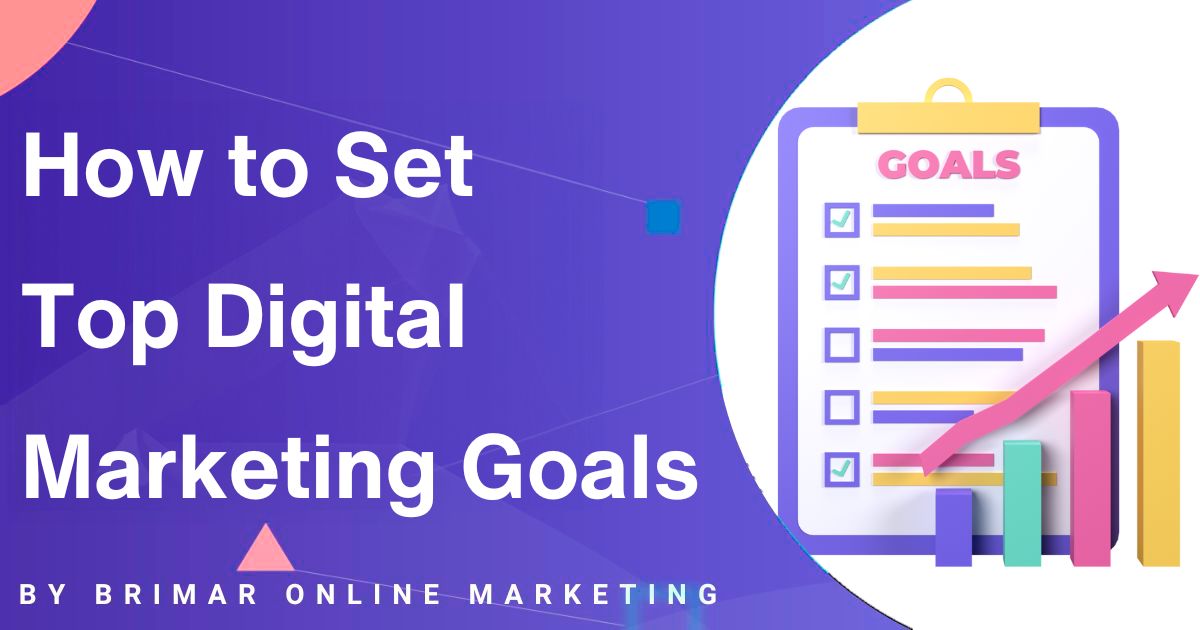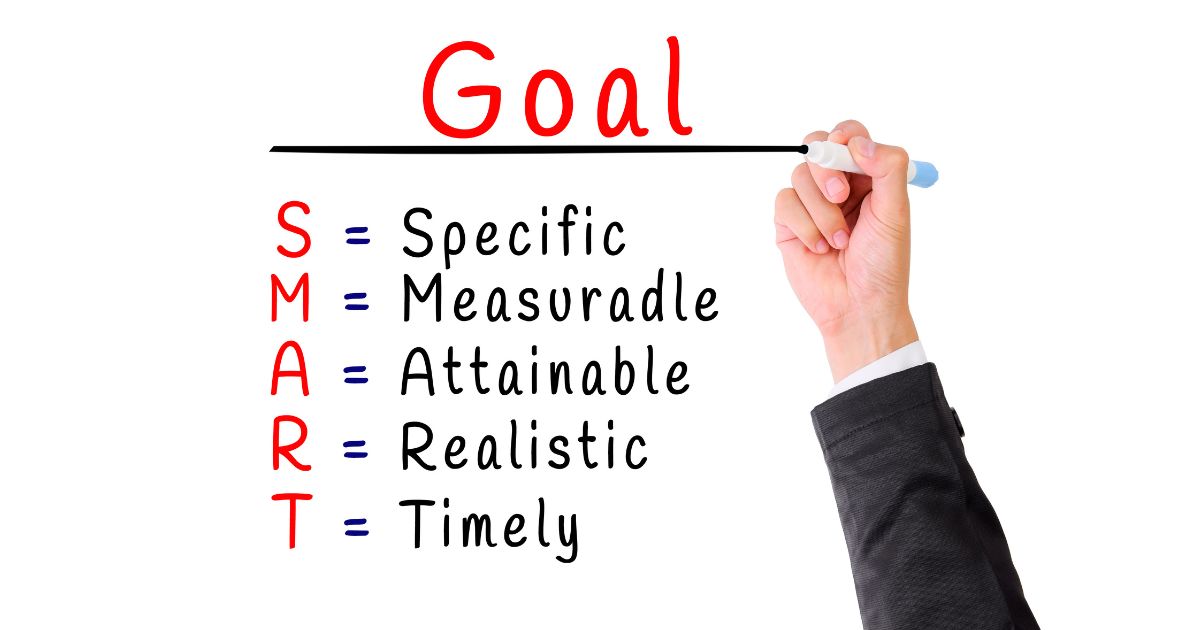
When growing your business online, having a clear direction is vital.
Digital marketing can be incredibly effective, but it’s like trying to hit a target in the dark without well-defined goals.
That’s where digital marketing goals come into play.
These goals help guide your strategy, keep your marketing efforts focused, and ensure that everything you do online contributes to your overall business objectives.
Whether you want to increase brand awareness, boost website traffic, or gain new customers, setting the right goals is the first step toward measurable success.
By aligning your digital marketing goals with your company’s broader business goals, you create a roadmap that drives results and helps you get the most out of your digital channels.
Let’s dive into why setting these goals is essential for business growth.
Tip # 1. Why Set Digital Marketing Goals?
Setting digital marketing goals is about giving your marketing efforts purpose and direction.
Without them, it’s hard to tell if what you’re doing is moving the needle for your business.
Establishing clear objectives ensures that your marketing is more than just an activity; it’s a deliberate effort that aligns with your business goals.
It matters because clear, measurable, and actionable goals help you stay on track.
When you define your digital strategy, you know exactly what you aim for more leads, better engagement, or higher conversion rates.
This makes it easier to choose the proper online channels and design a digital marketing plan that delivers better results.
Let’s say your specific goals include increasing website traffic or improving brand awareness.
By having those targets in place, you can tailor your marketing campaigns to meet those needs, whether it’s through social media, content marketing, or search engine optimization.
Every effort becomes part of a bigger picture.
Setting goals also gives you a way to measure success.
With defined digital marketing goals, you can track progress, adjust, and optimize your campaigns for ongoing improvement.
You’ll know what’s working and what’s not; that clarity leads to intelligent, data-driven decisions.
In short, setting specific goals turns your marketing into a strategic powerhouse that helps your business grow, whether focused on gaining more potential customers, increasing organic traffic, or just fine-tuning your overall digital strategy.
Need a Sales Funnel that Converts?
Struggling to turn clicks into customers?
A high-converting sales funnel could be the missing link. We’ll help you build a simple, straightforward, and effective funnel that guides your visitors step-by-step, so they take action, not just browse.
Tip # 2. Understanding Your Target Audience
Knowing who you’re speaking to is one of the most essential steps in creating effective digital marketing campaigns.
Your target audience is the people most likely to engage with your brand and become customers.
But how do you define this group?
This is where buyer personas come into play.
Buyer personas are fictional profiles representing your ideal customers based on actual data like demographics, behavior patterns, and preferences.
Understanding your target market is more than just knowing basic information like age or location.
It’s about digging deeper into their motivations, pain points, and what influences their decisions.
Knowing this lets you craft messages that speak directly to their needs and position your business as the perfect solution.
Think of it like a customer journey.
From the moment someone discovers your brand to when they decide to purchase, their experience with your content must feel personalized and relevant.
The better you know your audience, the more likely your digital marketing campaigns will resonate, ultimately leading to better results.
Whether you’re launching an ad, writing a blog post, or posting on social media, having a clear picture of your audience ensures that you’re reaching the right people at the right time.
Tip # 3. Types of Digital Marketing Goals
When setting digital marketing goals, it’s important to remember that they can vary depending on your business needs and where you’re at in your growth journey.
Some companies might focus on building brand awareness, while others are more concerned with lead generation or increasing website traffic.
Brand awareness is crucial for businesses just starting or launching a new product.
You want as many people as possible to know who you are and what you offer.
For companies with an established presence, the next focus might be driving conversion rates.
Here, you’re not just getting people to visit your website.
You’re encouraging them to take specific actions, like purchasing or signing up for a newsletter.
For business owners aiming for business growth, goals like increasing market share or attracting new customers are often the priority.
You may want to capture a more significant portion of your industry, or you’re trying to break into a new audience segment.
These goals are tied closely to improving website traffic and boosting engagement through channels like social media.
Lead generation is another common goal.
You increase the chances of converting those leads into paying clients by attracting more potential customers to your funnel.
In today’s landscape, solid digital marketing objectives, such as increasing organic traffic or enhancing the user experience, can significantly impact your marketing campaigns‘ success.
You’re giving your business a clear direction by clearly defining your goals, whether it’s social media engagement, improving conversion rates, or growing your market share.
This focus helps align your efforts and makes it easier to measure success and optimize for even better results.
Tip # 4. Using the SMART Framework to Set Goals

Setting goals for your digital marketing efforts can feel overwhelming at times.
But there’s a proven method to help make it easier: the SMART framework.
It’s a simple yet powerful approach that ensures your goals are not just wishful thinking but real, achievable targets.
Let’s break it down.
SMART stands for Specific, Measurable, Achievable, Relevant, and Time-bound.
These five elements help guide you toward goals that move the needle.
Here’s how it works:
- Specific: Your goals should be clear and focused. Saying, “I want more website traffic,” is too vague. A specific objective could be, “I want to increase my website traffic by 10% over the next quarter.”
- Measurable: How will you know if you’re succeeding if you can’t track progress? A measurable goal allows you to see accurate results. Using tools like Google Analytics can help you monitor those changes in website traffic or conversion rates.
- Achievable: It’s great to aim high, but your goals should be realistic. Setting an attainable goal that matches your resources and capabilities is critical to staying on track and motivated.
- Relevant: Ensure that your goals are in line with your overall business objectives. A goal like improving your online sales or boosting new customers should directly support your growth strategy.
- Time-bound: Give your goal a deadline. A short-term goal with a timeline creates a sense of urgency and helps keep your team accountable. For example, “Increase email subscribers by 15% in the next 60 days” gives you a clear finish line.
The SMART framework takes the guesswork out of goal setting and helps you focus on what’s truly important for your digital marketing efforts.
It turns your ambitions into structured plans, making success much more attainable.
Tip # 5. Common Digital Marketing Goals for Small Businesses
If you’re a small business owner, you’ve got a lot on your plate.
But setting clear, actionable digital marketing goals can make a huge difference in growing your business.
The good news?
You don’t have to aim for the moon, you just need smart marketing goals that fit your business size and resources.
Here are some common digital marketing goals for small businesses and how they can help drive results:
- Boosting website’s visibility: One of the most important goals for small businesses is improving online visibility. This can be done by optimizing your website for search engines (SEO) and focusing on generating quality content. The more visible your business is, the easier it is for potential customers to find you.
- Increasing online sales: Driving online sales is a top priority for many businesses. This could mean improving the user experience on your website, creating effective landing pages, or enhancing the checkout process. Minor tweaks in these areas can have a significant impact on conversions.
- Building a solid digital presence: A well-rounded digital marketing plan includes being active on multiple digital channels. Each platform offers unique opportunities to connect with your audience and strengthen your brand, from social media marketing to email marketing.
- Attracting new customers: Whether through organic reach, paid ads, or social media marketing, a primary goal for small businesses is bringing in new customers. The key is to know your audience and create personalized, targeted campaigns that resonate with them.
- Driving more web traffic: Every business needs visitors to their website, but the focus should be on web traffic that converts. Using tactics like SEO, content marketing, and paid ads, you can attract visitors who are more likely to become paying customers.
Setting these specific objectives can give your business the push it needs to grow in the digital space.
And the best part?
You don’t need a massive budget to see results, just a strategic plan and the right tools to track progress.
Tip # 6. Best Practices for Achieving Digital Marketing Goals

Knowing the best ways to achieve your digital marketing goals is vital.
The truth is that effective strategies can make or break your marketing efforts.
So, let’s dive into a few best practices that will help you get measurable results.
First, let’s talk about search engine optimization (SEO).
SEO is about improving your website’s visibility in search engines, making it easier for potential customers to find you.
It’s one of the most effective ways to drive organic traffic to your site without spending a fortune on ads.
The trick is to optimize your content for keywords that matter to your audience, ensure your site structure is easy to navigate, and get quality backlinks to boost your credibility.
Another best practice?
Content marketing.
Your audience constantly looks for valuable, relevant content, whether blog posts, videos, or social media updates.
Content creation is one of the most powerful tools in your digital marketing arsenal.
By consistently producing quality content, you engage your audience and build authority in your industry.
Focus on answering questions your audience is asking and providing solutions to their problems. This motivates them to return for additional experiences.
You’ll also want to leverage email marketing.
It’s one of the most effective digital marketing strategies for building lasting customer relationships.
You can nurture leads, promote your products, and boost conversions with personalized and targeted email campaigns.
The best part?
Email marketing offers one of the highest returns on investment (ROI) in the digital space.
And don’t forget about influencer marketing.
You can expand your reach and credibility by collaborating with influencers with a loyal following in your niche.
It’s a great way to promote your brand to a broader audience in an authentic way.
Lastly, your marketing campaigns need to be cohesive.
Whether it’s a social media push, a series of blog posts, or a combination of different channels, ensure that all your efforts work together toward the same goal.
Consistency across your digital platforms helps reinforce your message and build trust with your audience.
By focusing on these best practices: SEO, content creation, email marketing, influencer collaborations, and cohesive marketing strategies, you’ll set yourself up for success in reaching your digital marketing goals.
Tip # 7. Tracking Success with Digital Marketing KPIs
Setting goals is only half the battle; you must track your progress to see if your efforts are paying off.
This is where digital marketing KPIs (Key Performance Indicators) come into play.
They give you valuable insights into what’s working and what needs adjustment.
Start with tools like Google Analytics to get a clear picture of how your website and campaigns are performing.
Are people visiting your site?
Are they converting?
Google Analytics will provide the data you need to answer these questions.
You can track important metrics like web traffic, conversion rates, and user behavior.
This data forms the backbone of data-driven decisions, allowing you to adjust your strategies in real-time based on what’s actually working.
But don’t stop there. Dive into your historical data to see trends over time.
For example, are there certain months when your traffic spikes or drops?
Understanding these patterns helps you anticipate customer behavior and tailor your marketing accordingly.
Tracking KPIs also helps you understand your audience better.
For instance, by monitoring key results like where your traffic is coming from, you can see which marketing channels are most effective.
Whether it’s organic search, social media, or paid ads, knowing where your visitors are coming from allows you to focus your efforts on the channels delivering the best results.
Another important KPI is engagement.
Are people spending time on your site or bouncing off after a few seconds?
This is a good indicator of how well your content resonates with your potential customers.
If engagement is low, it might be time to revisit your content strategy or website experience.
Tracking your digital marketing KPIs gives you the valuable insights needed to optimize your marketing efforts.
Tip # 8. Align Digital Marketing Goals with Overall Business Objectives
One of the most important aspects of a successful digital marketing strategy is making sure it aligns with your broader business goals.
It’s not just about running campaigns or increasing website traffic; it’s about ensuring your digital marketing program supports your overall business objectives.
For business owners, this means thinking beyond short-term wins.
Every marketing activity should tie back to the company’s overall strategy for growth.
This is the point where the marketing team plays a pivotal role.
They need to clearly understand the company’s action plan so that the digital marketing efforts contribute to what truly matters, whether it’s increasing revenue, boosting brand awareness, or expanding into new markets.
A robust digital marketing plan isn’t developed in isolation.
It must support the overall business objectives.
For example, if the company aims to expand into a new market, the digital marketing strategy should focus on reaching that specific audience through targeted campaigns on the right platforms.
Or, if the company wants to grow its customer base, the marketing efforts should focus on lead generation and improving conversion rates.
When you align your digital marketing program with your company’s overall strategy, you create a roadmap that connects your marketing activities to measurable outcomes.
This alignment ensures that every marketing dollar spent is a step toward driving real business growth.
Tip # 9. Goal Setting for Long-Term Success

Setting goals is easy.
Setting the right goals, both short-term and long-term goals, is what leads to sustained success.
A common mistake is focusing too heavily on the short term, like getting quick leads or driving temporary traffic spikes.
While these can be important, they shouldn’t overshadow the bigger picture.
Balancing immediate wins with a larger strategy to achieve long-term success would be best.
Setting specific objectives helps you see where you want to go.
Every goal should be clear and actionable, whether it’s increasing brand awareness, driving more organic traffic, or growing online sales.
This is where attainable goals come into play.
Start with clear goals for what you want to accomplish in the next quarter, but always keep your eye on the bigger vision.
Break these down into smaller, measurable steps or next steps that you can track.
By doing this, you’ll have key results to guide you along the way.
Long-term success also requires flexibility.
As you hit milestones, evaluate your progress and adjust your strategy.
Digital marketing changes rapidly, so adaptability is key to achieving your long-term goals.
Balancing short-term wins with long-term planning drives sustainable growth over time.
It’s about ensuring each campaign you run provides immediate results and fits into the larger vision for your business’s future.
Final Thoughts
Setting clear digital marketing goals is one of the best ways to ensure you get the results you want from your marketing efforts.
When you align these goals with your overall business objectives, you create a roadmap that leads to better results and natural growth.
Whether you’re focusing on increasing website traffic, building brand awareness, or converting potential customers, having a starting point and clear objectives will help you track progress and adjust as needed.
The SMART framework is a powerful tool for specific, measurable, achievable, relevant, and time-bound goals
With this approach, you’ll always know where you’re headed and how to get there.
From improving conversion rates to driving more online sales, the right goals set the foundation for long-term success.
Now that you have solid goal examples in mind, what’s the next step?
It’s time to take action.
If you haven’t already, start outlining your own digital marketing plan.
Whether you’re a small business or looking to expand into new markets, creating a plan that aligns with your business goals will give you the focus you need to make the most of your marketing efforts.
Ready to get started?
Let’s create a strategy that drives results!
Our Digital Marketing Services Have Helped Our Clients Increase Their Revenue!
“I highly recommend Brimar if your looking to grow your online business. You will be satisfied with the high level of expertise and high quality of services. It has helped my business grow by leaps and bounds.”
CEO

